Abstract
In the present study, we examined how a reinforcement schedule history that generated high or low rates of responding influenced the effects of acute (Experiment 1) and chronic (Experiment 2) methadone administration. Initially, key-peck responses of pigeons were maintained under a variable-interval 90-s schedule of food presentation, and a methadone dose-response curve was determined with doses of 0.6, 1.2, and 2.4 mg/kg. The pigeons were then exposed, for at least 40 sessions, to either a fixed-ratio 50 schedule or a differential-reinforcement-of-low-rate 10-s schedule, or were given continued exposure to the variable-interval schedule. The methadone dose-response curve was redetermined after all pigeons again were responding under the variable-interval schedule. The effects of two different daily methadone doses (9.0 and 12.0 mg/kg/day) and withdrawal precipitated by naloxone also were assessed. Experience with a fixed-ratio or differential reinforcement of low rate schedule did not result in significantly different response rates under the variable-interval schedule and, in general, the acute effects of methadone did not have differential effects correlated with schedule history. However, for 2 of 4 subjects the rate-decreasing effects of methadone on rates of key pecking were greater following a history of low-rate responding, suggesting a possible interaction between schedule history and effects of methadone. Daily methadone administration under the variable-interval schedule revealed that pigeons with experience under the differential reinforcement of low rate schedule developed more rapid and complete tolerance to the rate-decreasing effects of methadone. Three of the 4 subjects in this group showed rate increases above drug-free baselines during chronic methadone dosing. Pigeons with a history of fixed-ratio responding also developed tolerance to the rate-decreasing effects of methadone but without the subsequent rate increases seen by subjects with low-rate histories. No subjects with variable-interval histories showed complete recovery of drug-free baselines, suggesting that interpolated training under other schedules may attenuate the rate-altering effects of chronically administered drugs. Naloxone (1.0 mg/kg), administered during the chronic methadone phase, resulted in greater disruption of responding by pigeons with a history of low-rate responding, as compared to subjects in the other two groups.(ABSTRACT TRUNCATED AT 400 WORDS)
Full text
PDF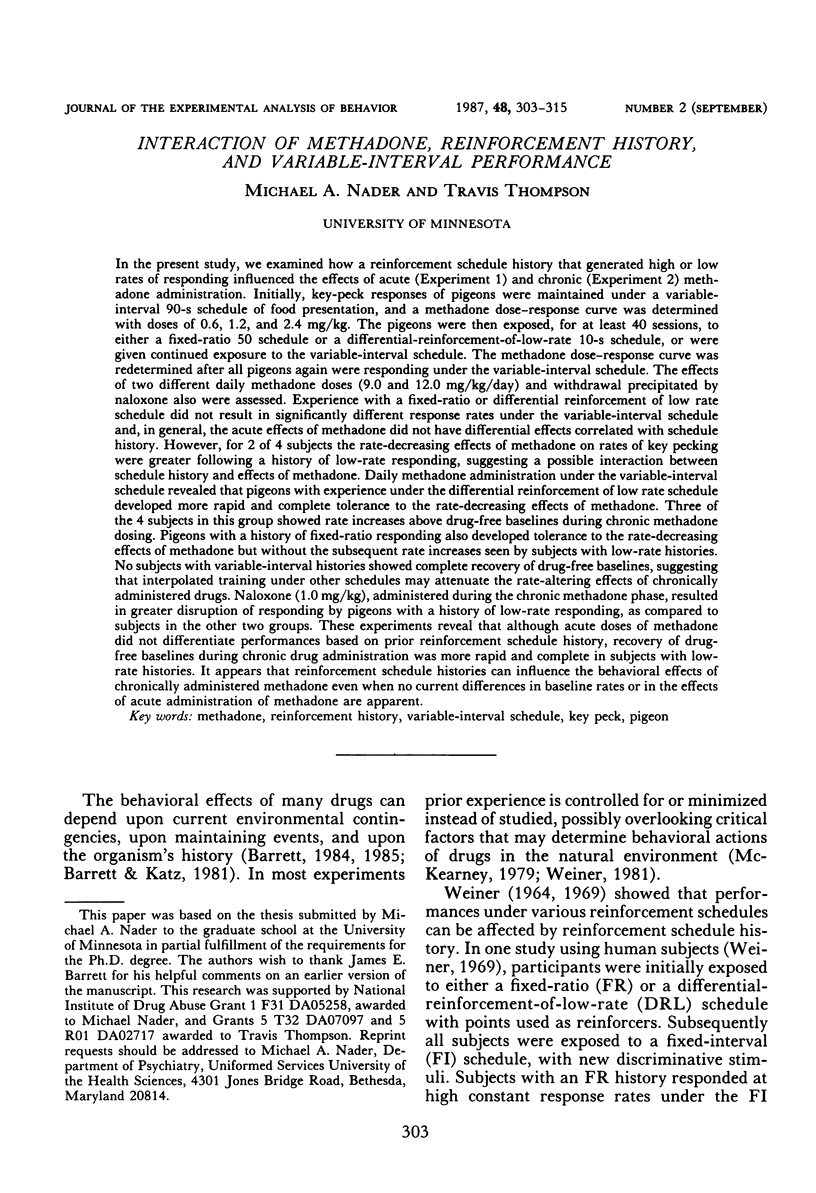
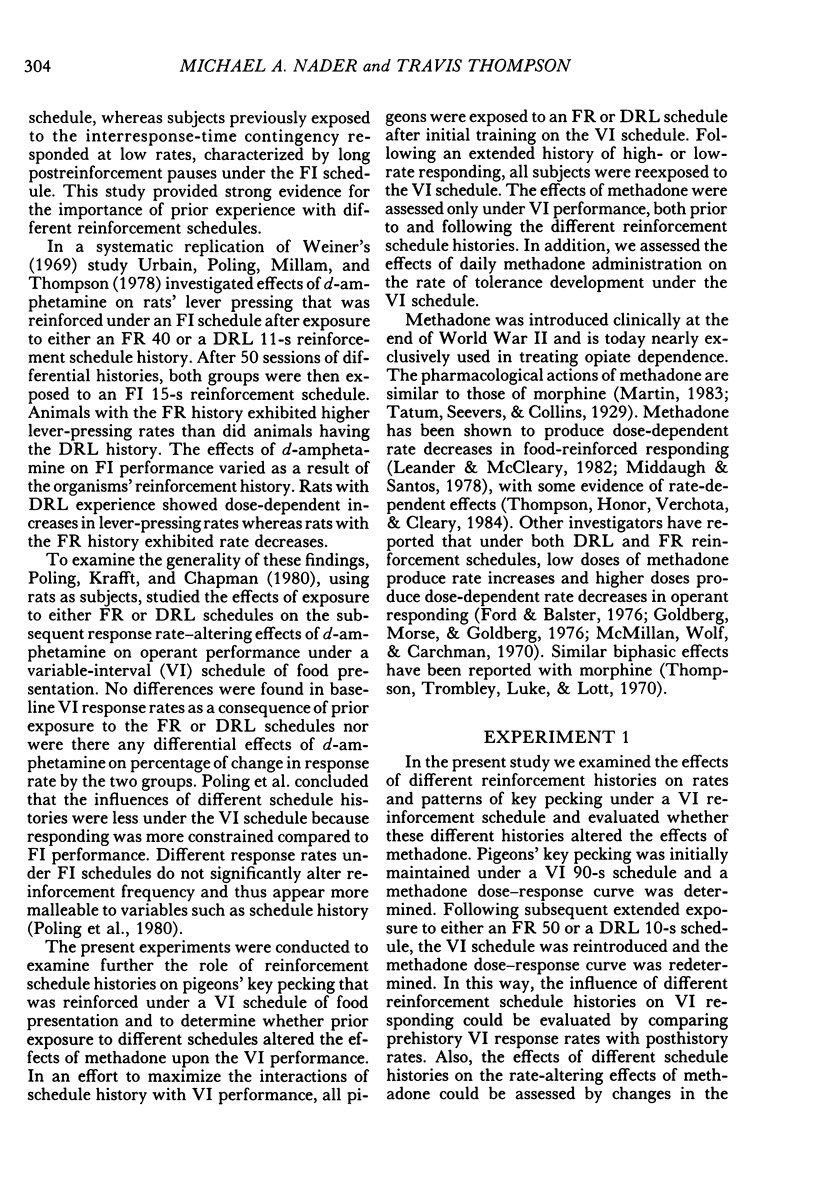
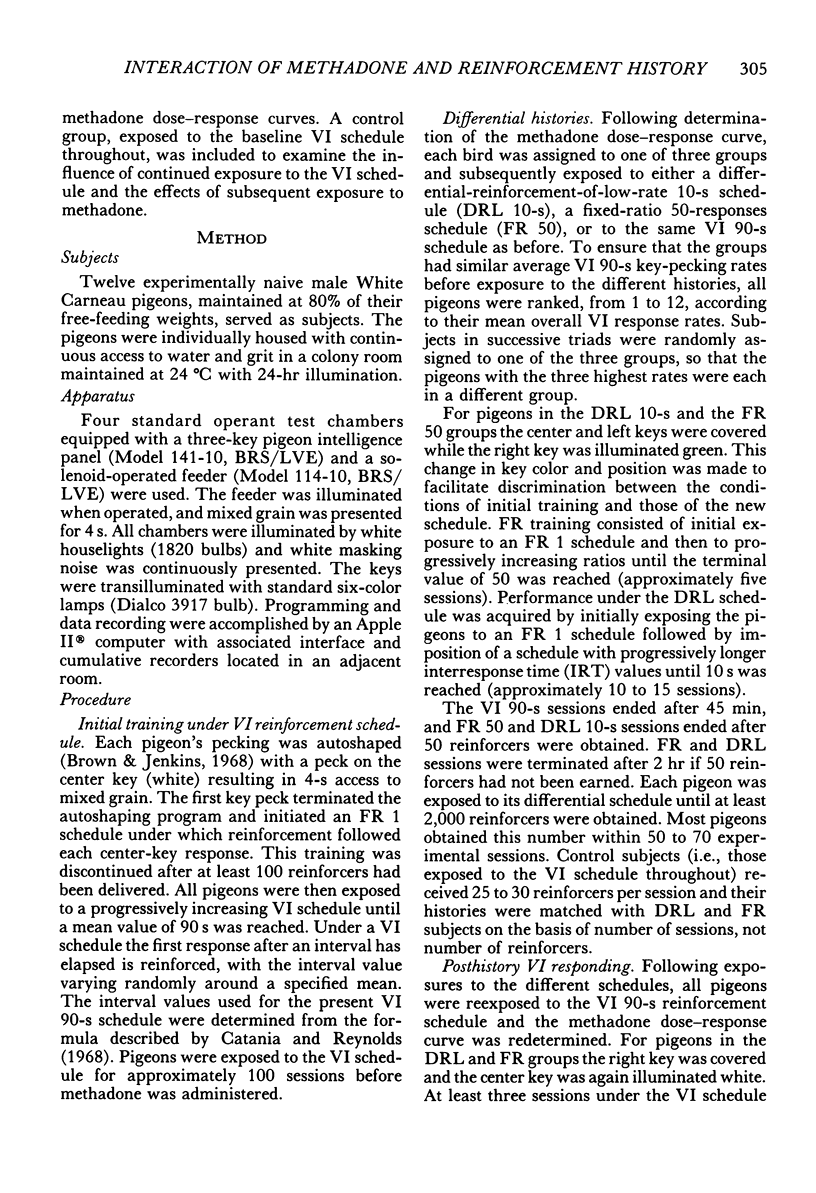
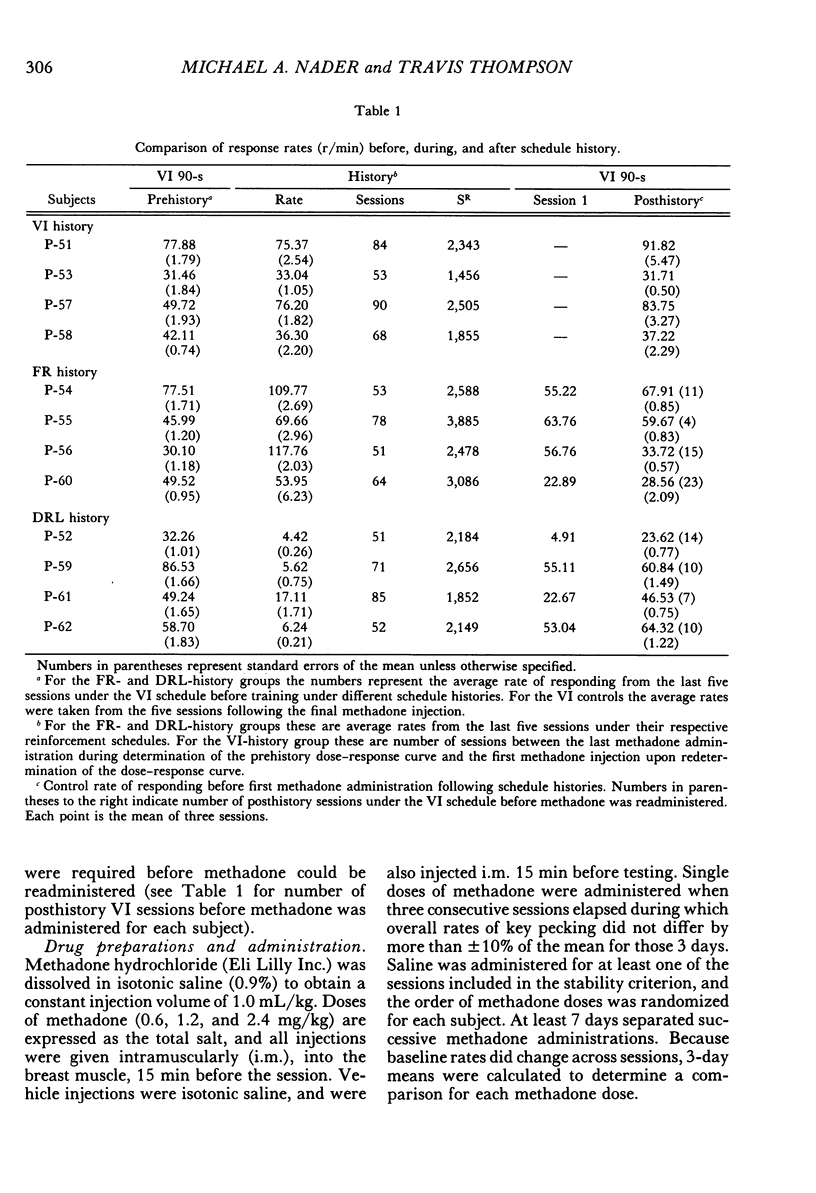
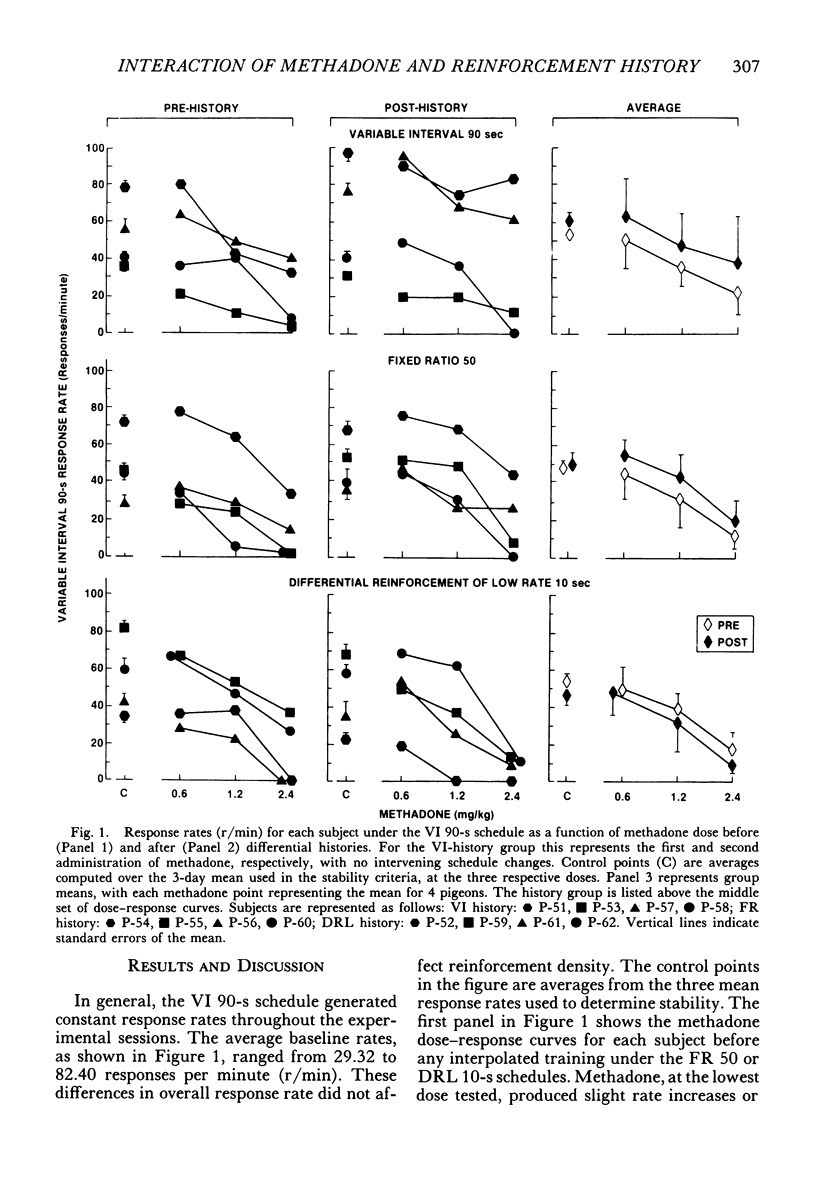
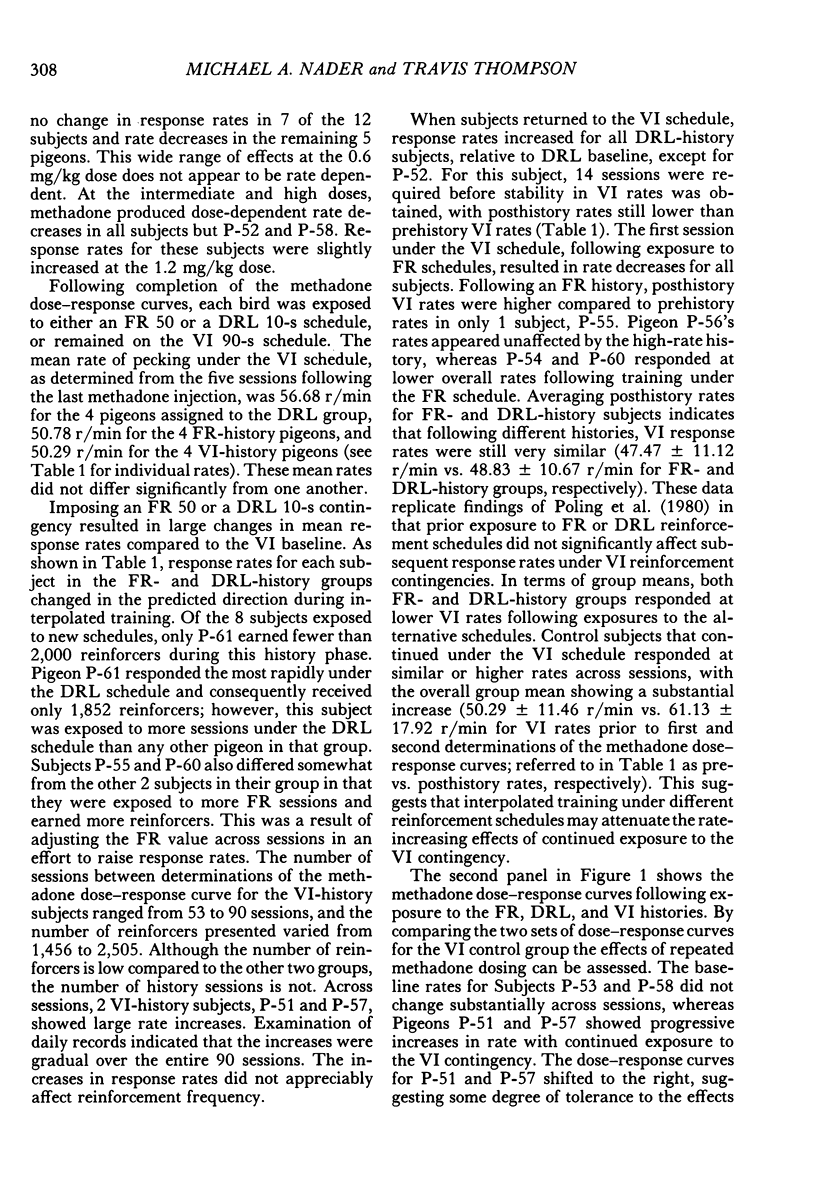
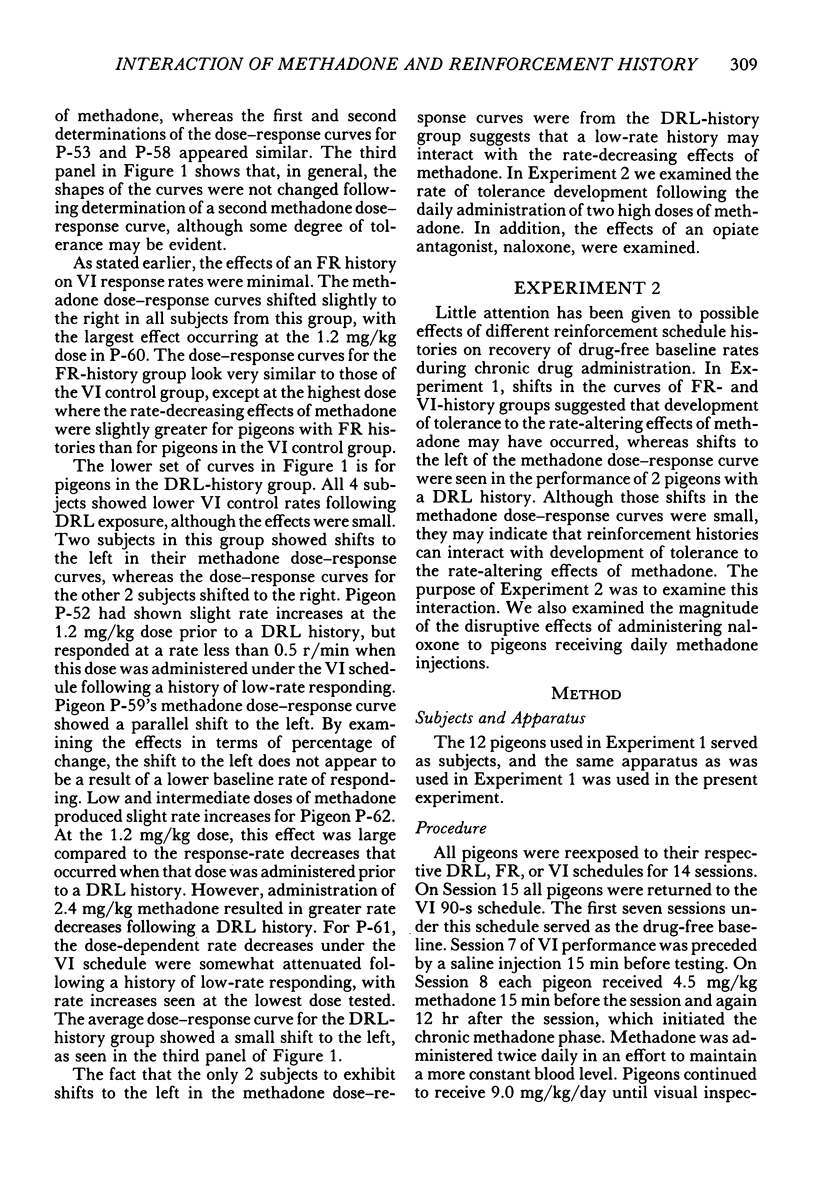
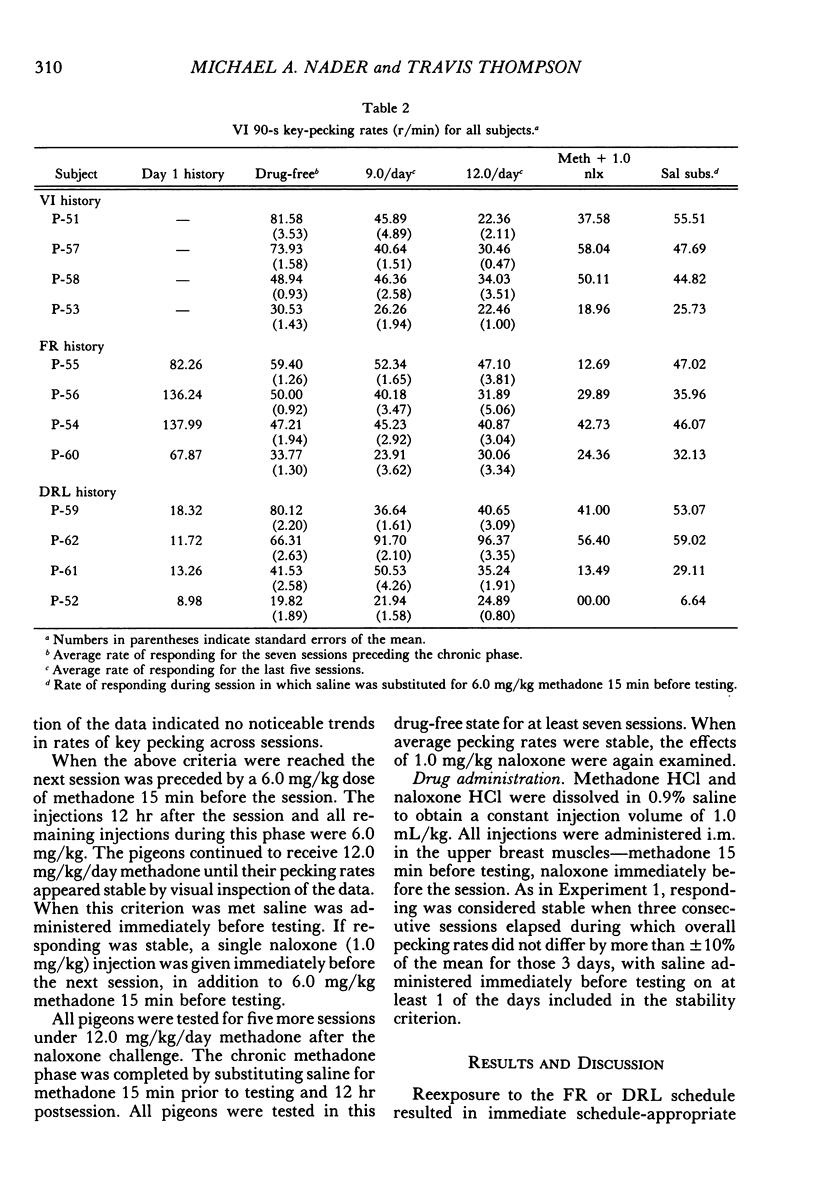
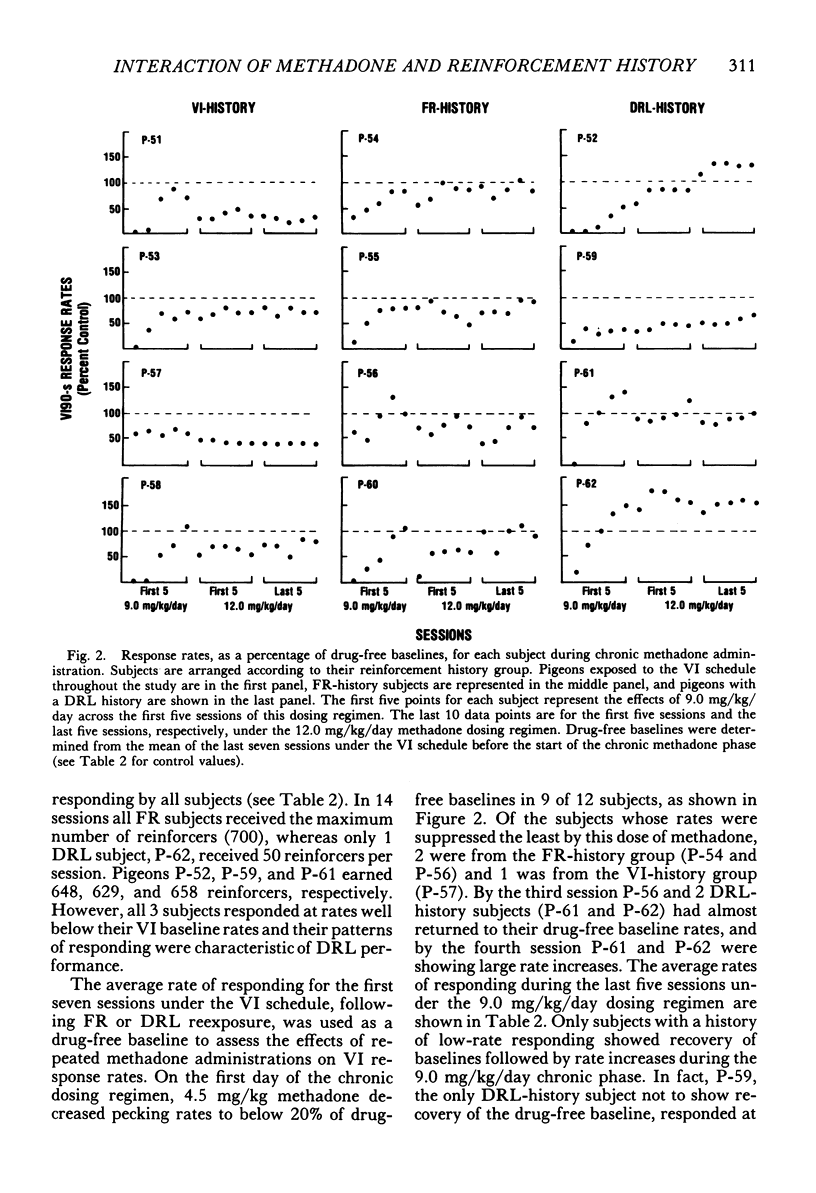
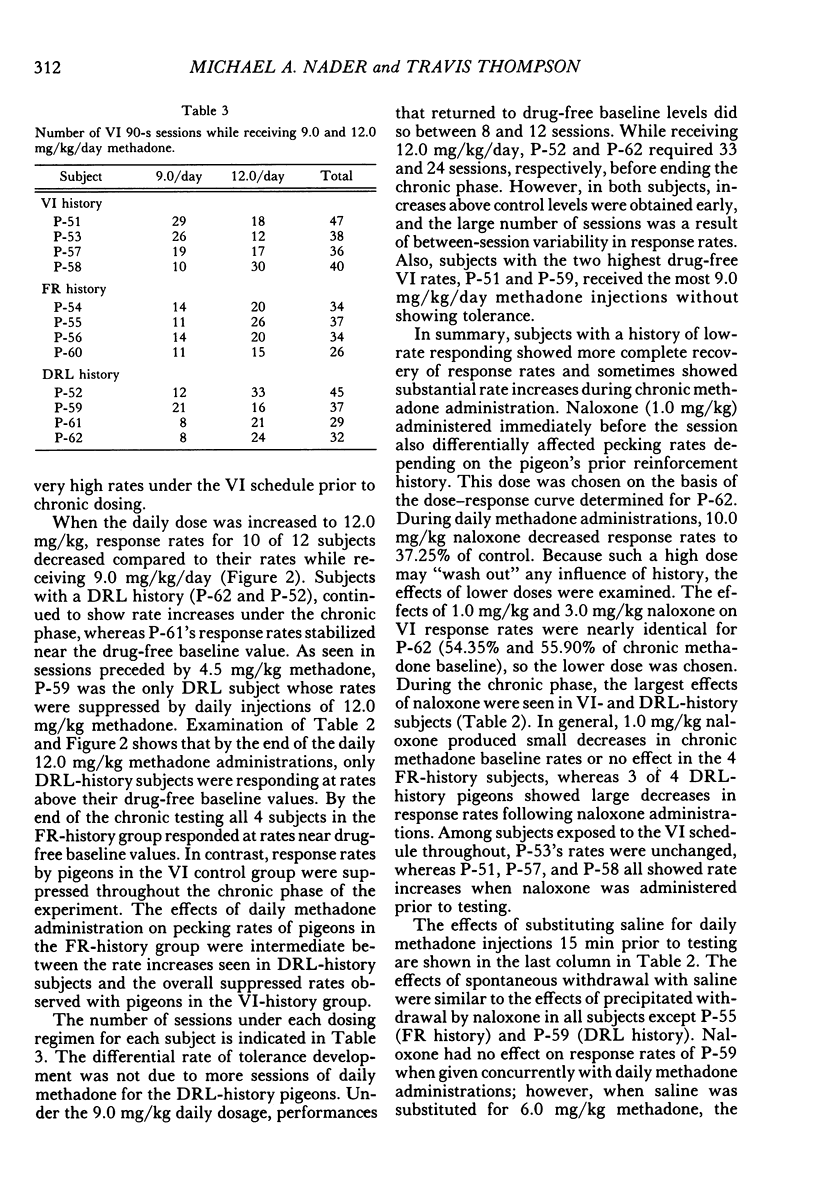
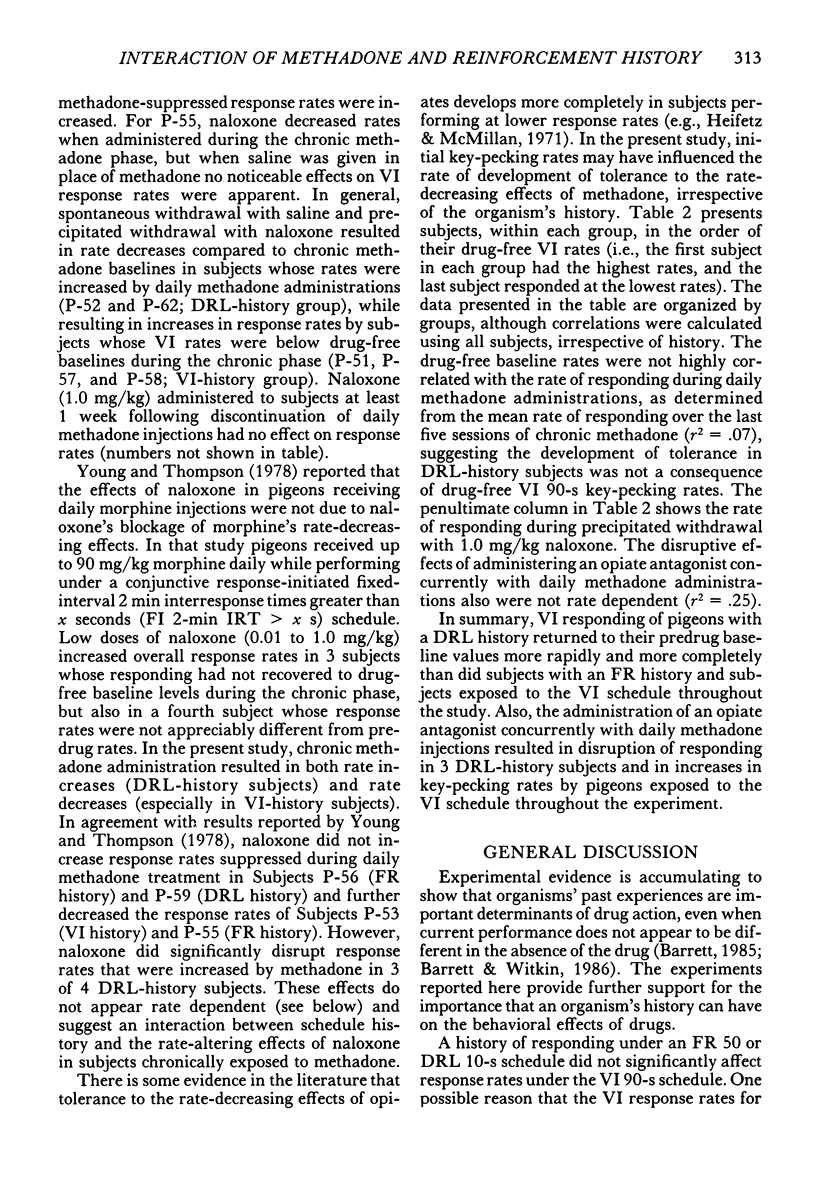
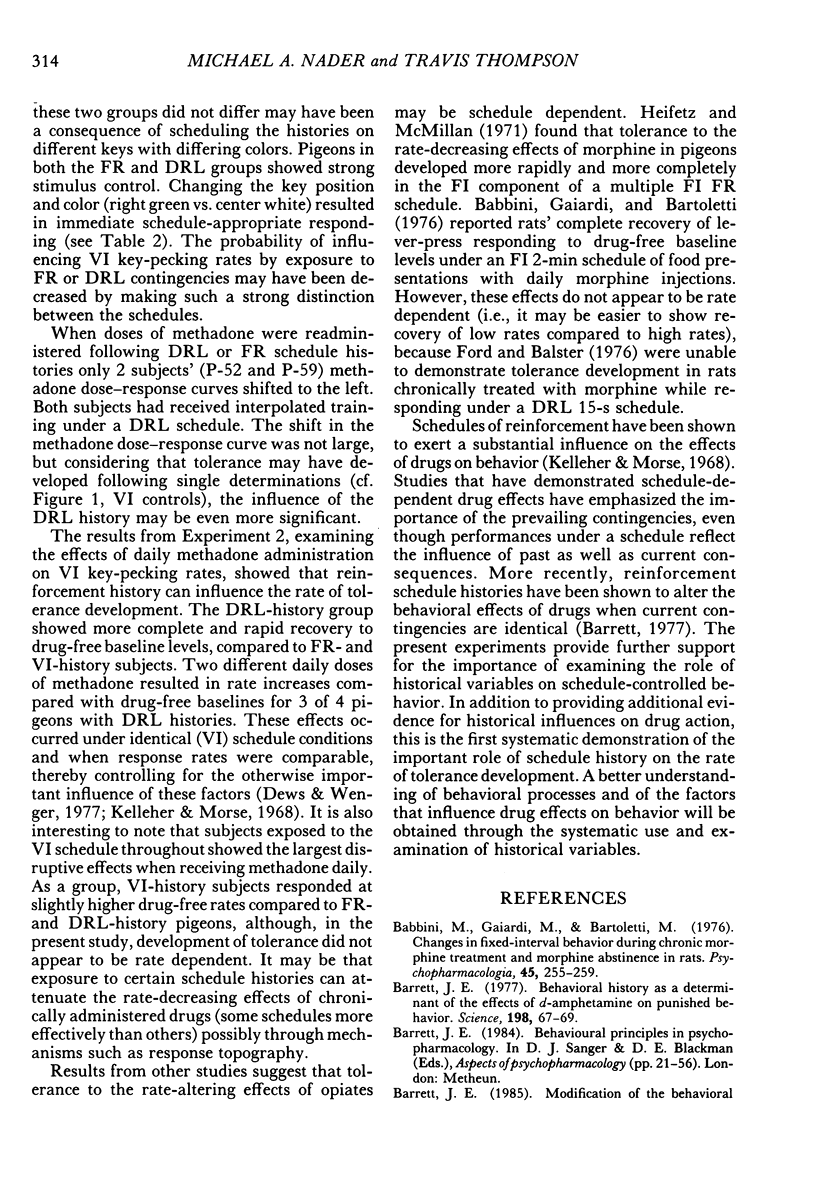
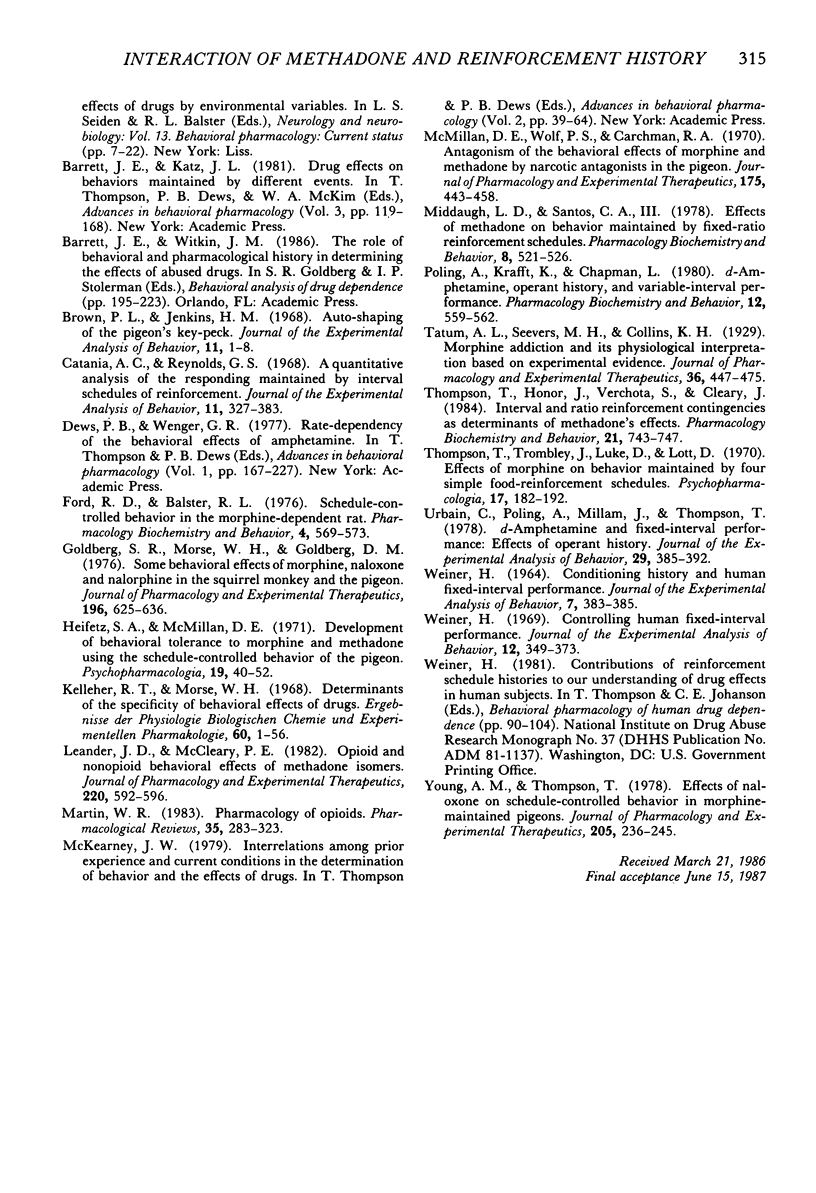
Selected References
These references are in PubMed. This may not be the complete list of references from this article.
- Babbini M., Gaiardi M., Bartoletti M. Changes in fixed-interval behavior during chronic morphine treatment and morphine abstinence in rats. Psychopharmacologia. 1976 Feb 2;45(3):255–259. doi: 10.1007/BF00421136. [DOI] [PubMed] [Google Scholar]
- Barrett J. E. Behavioral history as a determinant of the effects of d-amphetamine on punished behavior. Science. 1977 Oct 7;198(4312):67–69. doi: 10.1126/science.408925. [DOI] [PubMed] [Google Scholar]
- Brown P. L., Jenkins H. M. Auto-shaping of the pigeon's key-peck. J Exp Anal Behav. 1968 Jan;11(1):1–8. doi: 10.1901/jeab.1968.11-1. [DOI] [PMC free article] [PubMed] [Google Scholar]
- Catania A. C., Reynolds G. S. A quantitative analysis of the responding maintained by interval schedules of reinforcement. J Exp Anal Behav. 1968 May;11(3 Suppl):327–383. doi: 10.1901/jeab.1968.11-s327. [DOI] [PMC free article] [PubMed] [Google Scholar]
- Ford R. D., Balster R. L. Schedule-controlled behavior in the morphine-dependent rat. Pharmacol Biochem Behav. 1976 May;4(5):569–573. doi: 10.1016/0091-3057(76)90199-4. [DOI] [PubMed] [Google Scholar]
- Goldberg S. R., Morse W. H., Goldberg D. M. Some behavioral effects of morphine, naloxone and nalorphine in the squirrel monkey and the pigeon. J Pharmacol Exp Ther. 1976 Mar;196(3):625–636. [PubMed] [Google Scholar]
- Heifetz S. A., McMillan D. E. Development of behavioral tolerance to morphine and methadone using the schedule-controlled behavior of the pigeon. Psychopharmacologia. 1971;19(1):40–52. doi: 10.1007/BF00403701. [DOI] [PubMed] [Google Scholar]
- Kelleher R. T., Morse W. H. Determinants of the specificity of behavioral effects of drugs. Ergeb Physiol. 1968;60:1–56. doi: 10.1007/BFb0107250. [DOI] [PubMed] [Google Scholar]
- Leander J. D., McCleary P. E. Opioid and nonopioid behavioral effects of methadone isomers. J Pharmacol Exp Ther. 1982 Mar;220(3):592–596. [PubMed] [Google Scholar]
- Martin W. R. Pharmacology of opioids. Pharmacol Rev. 1983 Dec;35(4):283–323. [PubMed] [Google Scholar]
- McMillan D. E., Wolf P. S., Carchman R. A. Antagonism of the behavioral effects of morphine and methadone by narcotic antagonists in the pigeon. J Pharmacol Exp Ther. 1970 Nov;175(2):443–458. [PubMed] [Google Scholar]
- Middaugh L. D., Santos C. A. Effects of methadone on behavior maintained by fixed ratio reinforcement schedules. Pharmacol Biochem Behav. 1978 May;8(5):521–526. doi: 10.1016/0091-3057(78)90381-7. [DOI] [PubMed] [Google Scholar]
- Poling A., Krafft K., Chapman L. d-Amphetamine, operant history, and variable-interval performance. Pharmacol Biochem Behav. 1980 Apr;12(4):559–562. doi: 10.1016/0091-3057(80)90189-6. [DOI] [PubMed] [Google Scholar]
- Thompson T., Honor J., Verchota S., Cleary J. Interval and ratio reinforcement contingencies as determinants of methadone's effects. Pharmacol Biochem Behav. 1984 Nov;21(5):743–747. doi: 10.1016/s0091-3057(84)80013-1. [DOI] [PubMed] [Google Scholar]
- Thompson T., Trombley J., Luke D., Lott D. Effects of morphine on behavior maintained by four simple food-reinforcement schedules. Psychopharmacologia. 1970;17(2):182–192. doi: 10.1007/BF00402708. [DOI] [PubMed] [Google Scholar]
- Urbain C., Poling A., Millam J., Thompson T. d-amphetamine and fixed-interval performance: effects of operant history. J Exp Anal Behav. 1978 May;29(3):385–392. doi: 10.1901/jeab.1978.29-385. [DOI] [PMC free article] [PubMed] [Google Scholar]
- WEINER H. CONDITIONING HISTORY AND HUMAN FIXED-INTERVAL PERFORMANCE. J Exp Anal Behav. 1964 Sep;7:383–385. doi: 10.1901/jeab.1964.7-383. [DOI] [PMC free article] [PubMed] [Google Scholar]
- Weiner H. Contributions of reinforcement schedule histories to our understanding of drug effects in human subjects. NIDA Res Monogr. 1981 Jul;37:90–104. [PubMed] [Google Scholar]
- Weiner H. Controlling human fixed-interval performance. J Exp Anal Behav. 1969 May;12(3):349–373. doi: 10.1901/jeab.1969.12-349. [DOI] [PMC free article] [PubMed] [Google Scholar]
- Young A. M., Thompson T. Effects of naloxone on schedule-controlled behavior in morphine-maintained pigeons. J Pharmacol Exp Ther. 1978 Apr;205(1):236–245. [PubMed] [Google Scholar]


